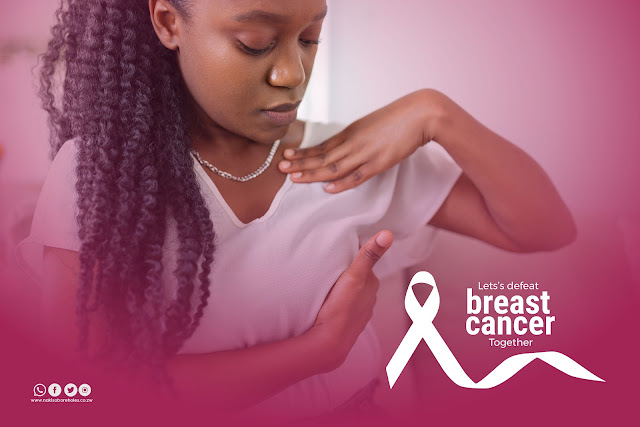October is Breast Cancer Awareness Month, an annual campaign to raise awareness about the impacts of Breast Cancer.
 |
| Breast Cancer Awareness Month: Nakiso Borehole Drilling Joins The Rest Of The World In Raising Awareness On Breast Cancer |
Breast cancer refers to cancers originating from breast tissue, most commonly from the inner lining of milk ducts or the lobules that supply the ducts with milk.
Nowadays, breast cancer is the most frequently diagnosed life-threatening cancer in women and the leading cause of cancer death among women.
According to World Health Organisation (WHO), Breast Cancer Awareness Month helps to increase attention and support for the awareness, early detection, and treatment as well as palliative care of the disease.
Below World Health Organisation Explains the common types of cancer, its causes and treatment.
What is cancer?
Cancer is a large group of diseases that can start in almost any organ or tissue of the body when abnormal cells grow uncontrollably, go beyond their usual boundaries to invade adjoining parts of the body and/or spread to other organs.
What are the most common types of cancer?
Lung, prostate, colorectal, stomach and liver cancer are the most common types of cancer in men, while breast, colorectal, lung, cervical and thyroid cancer are the most common among women.
What causes cancer?
Cancer arises from transforming normal cells into tumor cells in a multi-stage process that generally progresses from a pre-cancerous lesion to a malignant tumor. These changes are the result of the interaction between a person's genetic factors and three categories of external agents, including:
physical carcinogens, such as ultraviolet and ionizing radiation;
chemical carcinogens, such as asbestos, components of tobacco smoke, aflatoxin (a food contaminant), and arsenic (a drinking water contaminant); and
biological carcinogens, such as infections from certain viruses, bacteria, or parasites.
What are some of the risk factors for cancer?
Tobacco use, alcohol use, unhealthy diet, physical inactivity, and air pollution are risk factors for cancer (and other non-communicable diseases). Some chronic infections are risk factors for cancer. This is a particular issue in low- and middle-income countries. Approximately 13% of cancers diagnosed globally were attributed to carcinogenic infections, including Helicobacter pylori, human papillomavirus (HPV), hepatitis B virus, hepatitis C virus, and Epstein-Barr virus. Hepatitis B and C viruses and some types of HPV increase the risk for liver and cervical cancer, respectively. Infection with HIV substantially increases the risk of cancers such as cervical cancer.
How can we reduce the cancer burden?
Between 30% and 50% of cancers can currently be prevented by avoiding risk factors and implementing existing evidence-based prevention strategies.
The cancer burden can also be reduced through early detection of cancer and appropriate treatment and care of patients who develop cancer.
Many cancers have a high chance of being cure if diagnosed early and treated appropriately.
How can we prevent cancer?
not using tobacco;
maintaining a healthy body weight;
eating a healthy diet, including fruit and vegetables;
doing physical activity on a regular basis;
avoiding harmful use of alcohol;
getting vaccinated against HPV and hepatitis B if you belong to a group for which vaccination is recommended;
avoiding ultraviolet radiation (which primarily results from exposure to the sun and artificial tanning devices);
ensuring safe and appropriate use of radiation in health care (for diagnostic and therapeutic purposes);
minimizing occupational exposure to ionizing radiation; and
Nakiso Borehole Drilling is here to help you understand the signs and symptoms of breast cancer, also take note that October is the hottest month of the year. We encourage you to stay hydrated.
About Nakiso Borehole Drilling
At Nakiso Borehole Drilling, we are your comprehensive partner for unlocking reliable water on your property. Our highly skilled team tackles all drilling projects, from standard boreholes to specialized Blast Hole and RC Drilling.
We handle everything in-house for a seamless experience, encompassing expert borehole siting, efficient drilling, and pump installation – solar, electric, or manual – tailored to your specific needs. With Nakiso, your reliable water source is just a drill away.
We don't just strive to be the best; we maintain the industry's strictest quality standards and are committed to sustainable practices for the future of Zimbabwe's water security.
Fact 1: Know Your Borehole Casings
The Preferred Borehole Casing In Zimbabwe Is Class 9 and 10 (Pressure Classes.)
This is because Class 9 and Class 10 Casings are more collapse resistant. The strength of a Casing is often described as collapse resistance.
Fact 2: Borehole Drilling Depth
The exact depth, of where the water is located, cannot be established by the drilling contractor nor the Water Surveyor (Borehole Siter).
Fact 3: There Is No 100% Guarantee
It is important to note that it is never a 100% guarantee that any hole will yield water, the amount and water quality can also not be guaranteed by the drilling contractor and water surveyor.
Fact 4: Siting Is Important
Making use of a hydrologist or traditional water diviner will increase your chances of having a successful borehole that will yield a sufficient amount of water.
Fact 5: Know The Risks
The risk of the borehole drilling lies with the property owner. The client will still be liable for the drilling costs irrespective of a borehole yielding water or not.
Our Branches and Our Contacts

Churchill Ave Branch
Business Offices (HQ):55 Churchill Avenue,
Alexandra Park,
Harare North,
Zimbabwe.
Call Us Today:
Office Numbers: +263 867 71 88844
Sales: +263 78 860 8009
Operations: +263 78 860 8005
Marketing: +263 78 876 6701
Email: info@nakisoboreholes.co.zw
Website: www.nakisoboreholes.co.zw

Bluff Hill Branch
Business Offices:36 St. Anthans Drive,
Bluff Hill,
Harare,
Zimbabwe.
Call Us Today:
Office Numbers: +263 71 494 0883
Sales: +263 78 860 8009
Operations: +263 78 860 8005
Marketing: +263 78 876 6701
Email: info@nakisoboreholes.co.zw
Website: www.nakisoboreholes.co.zw






